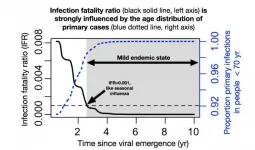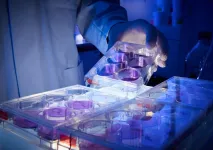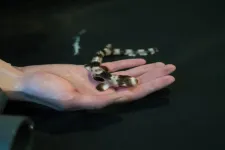DiosCURE to develop highly specific single-chain antibodies against SARS-CoV-2
Lead candidates described in Science publication
2021-01-12
(Press-News.org) Core technology includes promising bivalent single-domain antibodies simultaneously targeting two surface structures of the viral spike protein.
Lead candidates DIOS-202 and DIOS-203 are engineered for high potency and their potential to avoid the emergence of escape mutants.
DIOS-202 and DIOS-203 entered into accelerated development to initiate clinical studies later this year.
BONN, Germany, January 12, 2021 - DiosCURE SE announced a publication in Science describing its core technology of multivalent single-chain antibodies with a unique molecular mode-of-action to inactivate SARS-CoV-2 virions. An international team led by scientists at the University of Bonn developed and characterized the lead candidates, which are exclusively licensed by DiosCURE.
"This global pandemic requires an arsenal of therapeutic and preventative tools and our lead candidates will allow us to contribute to what will be an ongoing battle," stated Klaus Wilgenbus, Chief Executive Officer at DiosCURE. "DiosCURE was established with the goal of developing novel, best-in-class immunotherapies to protect a significant population which will remain at risk, including exposed healthcare workers, immunocompromised patients, non-responders to vaccines and patients experiencing post-acute COVID-19 syndrome. The data now published provides a solid foundation to continue our development efforts with the goal of entering the clinic later this year."
The company's lead candidates, DIOS-202 and DIOS-203, are synergistic combinations of single-domain antibodies derived from camelid heavy chain-only antibodies. These next-generation immunotherapies against SARS-CoV-2 were designed based on detailed structural information of the antibodies' interaction with its viral target protein and result from functional and evolutionary experiments. The discovery and promising early preclinical data were published in an article in Science entitled "Structure-guided multivalent nanobodies block SARS-CoV-2 infection and suppress mutational escape" on January 12, 2021. The study details the identification of DiosCURE's lead candidates out of millions of potential structures, as well as the rational design of multivalent constructs, which increased neutralizing activity more than 100-fold. Preclinical studies demonstrated that DIOS-202 and DIOS-203 selectively target two distinct epitopes of the SARS-CoV-2 spike protein at once, which largely prevents the emergence of escape mutants. The dual targeting induces the premature activation of the fusion machinery, rendering the virions non-infectious. These discoveries were accomplished through a collaborative effort of research groups at the University Hospital of the University of Bonn (led by the Institute of Innate Immunity and the Core Facility Nanobodies), The Scripps Research Institute and the Karolinska Institutet.
The lead candidates are expected to be highly efficacious, well-tolerated, cost-efficient in production and are amenable to a wide range of clinical applications. As immunotherapies, DIOS-202 and DIOS-203 are suitable as prophylactic and to treat infected patients to avoid severe COVID-19 disease.
"The structure-based multivalent single-chain antibodies we discovered have strong potential for clinical applications. This is owed to their highly potent neutralizing activity and in-built protection from the rapid emergence of escape mutants. The emergence of SARS-CoV-2 escape mutants will remain an ongoing challenge in this pandemic, and novel therapies are urgently needed to address this problem," stated Eicke Latz, Director of the Institute of Innate Immunity at the University of Bonn, co-founder and Board member of DiosCURE. "Our understanding of the short- and long-term consequences of SARS-CoV-2 is rapidly evolving, and rational therapeutics targeting the virus are needed to curb the potentially devastating consequences of COVID-19."
INFORMATION:
About DiosCURE
DiosCURE is developing next-generation immunotherapies focused on a novel approach against SARS-CoV-2. The Company's proprietary bi- and trivalent variable domains of heavy chain-only antibodies (VHHs) are synergistic combinations of single-domain antibodies, constructed following structural information and optimized for potency as well as their potential to avoid the emergence of escape mutants. DiosCURE designed lead candidates that target two different epitopes of the SARS-CoV-2 spike protein with the potential to be highly efficacious, well-tolerated and manufactured at a large-scale standardized process. To learn more about our company, please visit http://www.DiosCURE.com
DiosCURE Contacts:
Klaus Wilgenbus, M.D.
Chief Executive Officer
info@DiosCURE.com
Media Contacts:
Trophic Communications
Eva Mulder or Sophia Hergenhan, Ph.D.
DiosCURE@trophic.eu
+49 89 238 877 30
[Attachments] See images for this press release:

ELSE PRESS RELEASES FROM THIS DATE:
2021-01-12
While most people are able to eat a normal diet, many of those managing distinct nutritional requirements related to a disease or health condition rely on medical foods. Medical foods help patients meet their nutritional needs, often improving nutritional and health outcomes and quality of life. A recent publication in Current Developments in Nutrition, titled "Medical Foods: Science, Regulation, and Practical Aspects. Summary of a Workshop," shares the historical and regulatory context of medical foods and perspectives on their role in the future.
Medical foods help patients manage their nutritional needs, yet it can be very difficult for patients to have access to them. In August 2019, the Healthcare Nutrition Council (HNC), in partnership with the American Society ...
2021-01-12
What is the endgame for SARS-CoV-2, the virus that is causing worldwide devastation? If it becomes endemic -- circulating in the general population -- and most people are exposed in childhood, SARS-CoV-2 may join the ranks of mild cold-causing coronaviruses that currently circulate in humans, according to a model developed by Emory and Penn State scientists.
The model, published January 12 in Science, draws upon studies of the four common cold coronaviruses and SARS-CoV-1. For those viruses, the term "herd immunity" is incomplete and possibly misleading, says ...
2021-01-12
Antibodies are an important weapon in the immune system's defense against infections. They bind to the surface structures of bacteria or viruses and prevent their replication. One strategy in the fight against disease is therefore to produce effective antibodies in large quantities and inject them into the patients. The outgoing US President Donald Trump probably owes his rapid recovery to this method. However, the antibodies used to treat him have a complex structure, do not penetrate very deeply into the tissue and may cause unwanted complications. Moreover, producing antibodies is difficult and time-consuming. They are therefore probably not suitable for widespread use.
Mass production in yeast or bacteria
"We focus on another group of molecules, the nanobodies," ...
2021-01-12
Researchers at Karolinska Institutet in Sweden have developed, in collaboration with researchers in Germany and the U.S., new small antibodies, also known as nanobodies, which prevent the SARS-CoV-2 coronavirus from entering human cells. The research study, published in Science, shows that a combined nanobody had a particularly good effect - even if the virus mutated. According to the researchers, the nanobodies have the potential to be developed into a treatment for COVID-19.
Specific proteins, spike proteins, on the surface of the SARS-CoV-2 coronavirus help the virus infect host cells. Therefore, antibodies that block the spike proteins and prevent them from binding to the cell can be a way to stop infection.
From the perspective ...
2021-01-12
What will the SARS-CoV-2 outbreak look like ten years from now as it passes from pandemic to endemic, maintained at a constant baseline level in populations without being fueled by outside infections? Data from four endemic human coronaviruses, which circulate globally and cause only mild symptoms, may hold some answers, say Jennie Lavine and colleagues. Their analysis of the immunological and epidemiological data for these viruses helped them develop a model to predict the trajectory of SARS-CoV-2 as it becomes endemic. Most importantly, the authors say, their model incorporates distinct components of immunological protection--susceptibility to reinfection, weakening of the disease after reinfection, and transmissibility of the virus after reinfection--that each wane differently. Lavine ...
2021-01-12
An immunization strategy tested in mice protects against infection from SARS-CoV-2, as well as from potentially emerging animal coronaviruses, researchers say. The approach could be "used as described or easily adapted" to provide defense against newly discovered zoonotic coronaviruses. In the last 20 years, three betacoronaviruses have caused devastating disease in humans. The global pandemic caused by the latest such virus, SARS-CoV-2, highlights the need to protect against other strains that could present a threat to humans, possibly through a pan-coronavirus vaccine. To support related efforts, ...
2021-01-12
Thanks to major progress in the understanding and management of rare congenital diseases and syndromes, many patients with these rare disorders are now living longer lives. With this progress it has become apparent that many non-skeletal rare diseases have an impact on bone mass, bone quality and/or bone metabolism, with potentially severe repercussions for quality of life in adults.
The new paper 'Bone fragility in patients affected by congenital diseases non skeletal in origin', published in Orphanet Journal of Rare Diseases by the International Osteoporosis Foundation (IOF) Skeletal Rare Diseases Working Group (SRDWG), provides ...
2021-01-12
Most people experience turbulence primarily from the experience of flying in an airplane. However, turbulence is a key feature of nature and is found everywhere, from rivers to galaxies.
Turbulent-like dynamics are difficult to capture in a still image. However, Leonardo da Vinci did everything possible to identify the underlying order of the phenomenon, which he observed in eddy currents forming randomly in water. In fact, he was fascinated by trying to understand and describe the generating principles governing such complicated dynamics. This is so much ...
2021-01-12
Scientists are combining artificial intelligence and advanced computer technology with biological know how to identify insects with supernatural speed. This opens up new possibilities for describing unknown species and for tracking the life of insects across space and time
Insects are the most diverse group of animals on Earth and only a small fraction of these have been found and formally described. In fact, there are so many species that discovering all of them in the near future is unlikely.
This enormous diversity among insects also means that they have very different life histories and roles in the ecosystems.
For ...
2021-01-12
A new study conducted at the New England Aquarium finds that as climate change causes the ocean to warm, baby sharks are born smaller, exhausted, undernourished, and into environments that are already difficult for them to survive in.
In a recently published paper in the journal Scientific Reports, lead author Carolyn Wheeler, a Ph.D. candidate at the University of Massachusetts Boston and at the ARC Centre of Excellence for Coral Reef Studies at James Cook University, examined the effects of increased temperatures on the growth, development and physiological performance of epaulette ...
LAST 30 PRESS RELEASES:
[Press-News.org] DiosCURE to develop highly specific single-chain antibodies against SARS-CoV-2
Lead candidates described in Science publication





